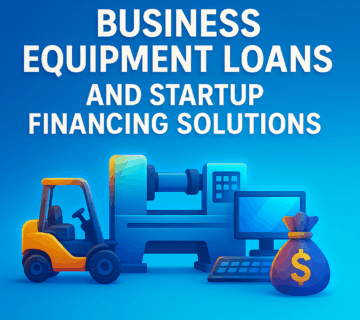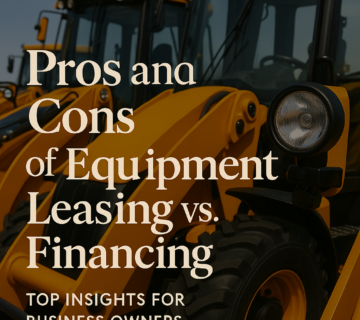How Financing Equipment for Small Business Can Drive Long-Term Growth

For small businesses and startups, acquiring equipment such as servers, communication systems, and industry-specific tools is essential for operations and growth. Whether it’s a restaurant investing in kitchen appliances or a tech firm needing servers and VoIP support, equipment can represent a substantial upfront cost. Financing equipment for small business provides a smart solution, offering a way to access critical assets without a major capital outlay. By leveraging equipment loans for business and equipment loans for startup business, small companies can keep cash on hand for other needs, enabling them to scale more sustainably.
This article explores the types of equipment financing, the benefits for small businesses, and practical applications like server services and VoIP support for growing businesses.
What is Equipment Financing?
Equipment financing is a lending arrangement that allows businesses to obtain necessary equipment without paying the full purchase price upfront. This approach enables small businesses to acquire technology, machinery, or tools critical for daily operations and future growth while spreading out payments over time. For startups and small companies, financing equipment—like server services or VoIP systems—can preserve working capital and avoid the strain of upfront costs.
Types of Equipment Loans for Business
Small businesses can choose from several financing options, depending on their needs and financial goals:
- Equipment Loans for Business: These loans provide funds specifically for purchasing equipment. With an equipment loan, the business typically owns the equipment after the loan is repaid. Equipment loans can offer lower interest rates since the equipment itself serves as collateral.
- Leasing Options: Leasing allows businesses to use equipment for a fixed period, often with the option to purchase or upgrade the equipment at the end of the lease term. Leasing is ideal for high-tech items like servers and VoIP systems, which may need regular updates.
- Vendor Financing: Some equipment providers provide direct financing to customers. This option can be particularly beneficial for small businesses, as vendor financing often includes promotional rates or discounts, and the application process is generally streamlined.
How Equipment Loans for Startup Business Work
For startup companies, equipment loans are an invaluable tool, allowing new businesses to access the resources they need to operate and grow without requiring extensive upfront capital. Here’s a basic overview of how equipment loans for startups work:
- Assess Equipment Needs: Identify essential items such as servers, VoIP support systems, or industry-specific machinery.
- Choose a Lender: Seek out lenders that specialize in equipment loans for startup businesses, as they may offer more flexible terms or alternative qualification criteria.
- Application Process: Submit an application, which may require a business plan, financial projections, or personal credit details.
- Loan Approval: Once approved, review the loan terms, such as interest rate, repayment schedule, and any collateral requirements.
- Acquire and Use Equipment: With financing in place, the business can acquire the equipment and begin using it immediately.
- Repayment: Follow the agreed-upon repayment plan while benefiting from the equipment’s impact on operations and growth.
Benefits of Equipment Financing
There are numerous advantages to financing equipment rather than purchasing it outright, especially for small businesses:
- Cash Flow Preservation: Financing equipment allows businesses to retain working capital that can be invested in other areas, such as marketing, payroll, or growth initiatives.
- Tax Benefits: Depending on the financing structure, businesses can often deduct loan interest payments or depreciation on purchased equipment. Section 179 of the tax code permits small firms to deduct the whole cost of eligible equipment in the year of purchase, thereby lowering taxable income.
- Flexible Repayment Options: Many lenders offer payment plans that align with cash flow cycles, allowing seasonal businesses or startups with irregular revenue to manage repayments more comfortably.
- Access to High-Value Equipment: Financing allows small businesses to access high-quality equipment they might not otherwise afford, from servers to VoIP systems, all of which can contribute to a competitive advantage.
Financing Options for Small Business Needs: Servers and VoIP Support
In industries that rely on advanced technology and communication, high-cost items like servers and VoIP systems are often critical. Here’s how financing can make these essential investments more accessible:
- Server Services: For many tech-driven companies, investing in server services is essential for data storage, security, and processing power. Server equipment can be a substantial upfront investment, especially if you need to establish on-premises infrastructure. Equipment financing enables businesses to acquire these servers affordably, spreading the cost over time.
- VoIP Support Systems: Communication is a cornerstone of any business, and VoIP (Voice over Internet Protocol) technology offers a flexible, cost-effective way to manage calls and customer support. Financing VoIP equipment, such as IP phones, network systems, and software, allows small businesses to establish a high-quality communication infrastructure without depleting cash reserves.
How Equipment Financing Supports Long-Term Growth
Equipment financing allows small businesses to expand operations efficiently. When a company can acquire assets without depleting cash, it can more easily take on new projects, hire additional employees, or even enter new markets. For example, by financing equipment for small business needs like servers and VoIP systems, a company can increase productivity, improve communication, and serve more clients, all while managing costs.
Building Business Credit with Equipment Loans
One lesser-known advantage of financing equipment is that timely payments can positively impact a business’s credit profile. For startups and small businesses, establishing strong credit early on is critical for future growth, as it makes securing loans easier and offers more favorable terms down the line. Building business credit through responsible use of equipment loans can create a foundation for larger investments in the future.
Flexible Repayment Options
One key benefit of equipment financing is the range of payment plans available. Many lenders work with small businesses to customize plans that fit their revenue cycles. For example, businesses with seasonal income can negotiate payment deferments or customized plans, ensuring they meet obligations even during slower months.
Staying Competitive with the Latest Technology
In industries where technology is central to operations, staying competitive requires frequent equipment upgrades. Financing enables small businesses to invest in the latest tech without significant financial strain. Whether it’s upgrading server services or adopting a new VoIP support system, financing allows businesses to stay competitive and increase operational efficiency.
Tax Benefits of Equipment Financing
Equipment financing can offer significant tax advantages. Depending on the financing type, businesses can deduct loan interest or claim depreciation on purchased assets. Additionally, under Section 179 of the IRS tax code, small firms can deduct the whole cost of eligible equipment in the year of purchase. This makes financing equipment for small businesses even more attractive, as it helps reduce taxable income and increases cash flow for other needs.
Common Mistakes to Avoid in Equipment Financing
While equipment financing offers many benefits, there are pitfalls to watch out for:
- Overborrowing: Only finance what is truly necessary to avoid high interest costs.
- Ignoring the Fine Print: Ensure you fully understand all terms, including fees for late payments or conditions for returning leased equipment.
- Failing to Compare Options: Shop around to find the best rates and terms that align with your business’s cash flow needs.
Real-Life Examples of Equipment Financing Success
Consider a small tech startup that needed a reliable server setup to manage data and handle customer projects. By financing the server equipment, the company could spread out the cost, preserving capital for hiring and expansion. Similarly, a growing customer support provider used equipment financing to set up an advanced VoIP system, enhancing call quality and increasing customer satisfaction without a major initial investment.
Frequently Asked Questions (FAQs)
1. Can equipment financing help startups with limited credit history?
Yes, many lenders specialize in equipment loans for startup business financing, offering alternative qualifications or flexible terms. Startups with limited credit can still access financing, although personal guarantees or slightly higher interest rates may apply.
2. Are there specific financing options for servers or IT equipment?
Yes, several lenders offer financing for tech equipment like servers. These loans typically have terms and repayment schedules designed to accommodate the high cost and potential rapid obsolescence of IT hardware.
3. What’s the difference between leasing and equipment loans?
Leasing allows businesses to rent equipment without ownership, ideal for items that frequently need upgrading, like servers. An equipment loan provides funds to purchase the equipment outright, and the business owns it once the loan is paid.
4. Can VoIP systems be financed?
Yes, many lenders provide financing options for VoIP support equipment, enabling small businesses to set up high-quality, scalable communication infrastructure affordably.
5. What tax benefits are available with equipment financing?
Under IRS Section 179, small businesses can deduct the full cost of qualifying equipment in the purchase year, and loan interest payments may also be tax-deductible.
6. How does equipment financing build business credit?
Timely payments on equipment loans or leases can enhance a business’s credit profile, leading to easier access to future financing and favorable terms.
Conclusion
Financing equipment for small businesses is a strategic approach that enables companies to access essential assets, from servers to VoIP systems, without straining cash flow. By using equipment loans for business, companies can maintain liquidity, stay competitive with updated technology, and build credit for future growth. Thoughtful financing empowers businesses to grow sustainably, making it a powerful tool for small businesses and startups looking to expand efficiently and achieve long-term success.




No comment